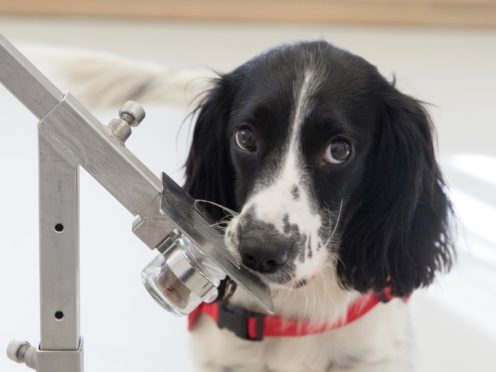Dogs could be trained to sniff out malaria in people after trials showed the animals were able to smell the deadly disease in samples of socks worn by infected children.
Researchers said their findings could potentially lead to the first rapid and non-invasive test for malaria.
Although the research is in its early stages, scientists hope trained sniffer dogs could help to stop malaria spreading between countries and lead to infected people being identified earlier and treated quickly.
Principal investigator, Professor Steve Lindsay, of the Department of Biosciences at Durham University, said: “While our findings are at an early stage, in principle we have shown that dogs could be trained to detect malaria infected people by their odour with a credible degree of accuracy.
“This could provide a non-invasive way of screening for the disease at ports of entry in a similar way to how sniffer dogs are routinely used to detect fruit and vegetables or drugs at airports.
“This could help prevent the spread of malaria to countries that have been declared malaria-free and also ensure that people, many of whom might be unaware that they are infected with the malaria parasite, receive antimalarial drug treatment for the disease.”
Nearly half of the world’s population is at risk of malaria, according to the World Health Organisation (WHO).
In 2016, there were an estimated 216 million cases of malaria – an increase of five million cases over the previous year – and an estimated 445,000 malaria deaths. Around 90% of cases are in Sub-Saharan Africa.
The disease is caused by parasites transmitted to people through the bites of infected female Anopheles mosquitoes, but it can be prevented and cured with antimalarial drugs.
The study saw researchers from the Medical Research Council Unit The Gambia at the London School of Hygiene & Tropical Medicine use nylon socks to collect foot odour samples from apparently healthy children aged five to 14 in the Upper River Region of The Gambia in West Africa.
Using a simple finger-prick test the children were also screened to determine if they had the malaria parasite Plasmodium falciparum in their blood.
The sock samples were transported to the Medical Detection Dogs (MDD) charity in Milton Keynes, where two dogs, a Labrador-Golden Retriever cross called Lexi and a Labrador called Sally, were trained to distinguish between the scent of children infected with malaria parasites and those who were uninfected.
In total, 175 sock samples were tested including those of all 30 malaria-positive children identified by the study and 145 from uninfected children.
The dogs were able to correctly identify 70% of the malaria-infected samples. The dogs were also able to correctly identify 90% of the samples without malaria parasites.
The team said sniffer dogs could provide a non-invasive, portable and rapid test for identifying malaria carriers and would be particularly useful in settings where there are few individuals with malaria parasites.
Confirmation of the disease would then be made by taking a finger-prick sample of blood using a rapid diagnostic test.
Globally, 216 million people were infected with #malaria in 2016, 5 million more than the previous year. Increased funding for #malaria is needed to beat the disease https://t.co/JYd1IDjLEV #WorldMalariaDay pic.twitter.com/1gSEqyuQVs
— World Health Organization (WHO) (@WHO) April 25, 2018
Since the initial study a third dog, a Springer Spaniel called Freya, has also been trained to detect malaria.
The research is being presented at the American Society of Tropical Medicine and Hygiene Annual Meeting in New Orleans, US.
Study co-author and MDD chief executive, Dr Claire Guest, said its dogs have also been able to detect cancer and diabetes sugar changes.
She added: “This is the first time we have trained dogs to detect a parasite infection and we are delighted by these early results.
“The possible potential to train dogs to detect tropical disease where diagnostics are poor, such as leishmaniasis and trypanosomiasis is huge.
“I believe that this study indicates that dogs have an excellent ability to detect malaria and if presented within an individual infected with the parasite or a piece of recently worn clothing, their accuracy levels will be extremely high.
“This is a reliable, non-invasive test and is extremely exciting for the future.”
Future studies are needed to see if dogs can detect malaria in the odour of infected people from other parts of the world, before the animals could be used in the field, researchers added.
